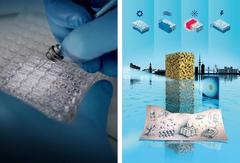URL: https://www.desy.de/news/news_search/index_eng.html
Breadcrumb Navigation
DESY News: Two DESY-linked Excellence Strategy proposals advance to the next stage
News
News from the DESY research centre
Two DESY-linked Excellence Strategy proposals advance to the next stage
Last week, the German Research Association and the Scientific Council gave the green light for two Hamburg-based proposals for the German Excellence Strategy to advance to the next stage of development. DESY will be crucial members of both initiatives: one regarding disease research at Universität Hamburg and one regarding water-driven materials at the Hamburg University of Technology (TUHH).

The two excellence cluster proposals deal respectively with infectious disease research including its structural biology aspects and water-driven new materials. (Bild, l: Christian Schmid r: TU Hamburg / Martin Künsting)
“Gateways to Health: How Pathogens Shape Global Life” would be a fifth Cluster to be found at Universität Hamburg, with its focus being infectious disease monitoring and research. The Cluster would hone in on the various critical impacts infectious disease has on our lives, involving experts from biosciences, the humanities, and social sciences, while also targeting the molecular and cellular processes of infection and disease dispersal as a means of enabling therapies and preventing epidemics and pandemics. Other partners in Gateways are the Bernhard Nocht Institute for Tropical Medicine (BNITM), the University Medical Center Hamburg-Eppendorf (UKE), Forschungszentrum Borstel, and the Leibniz Institute for Virology (LIV). DESY lead scientist Meytal Landau plays a central role in this proposed Cluster as a principal investigator.
“BlueMat: Water-Driven Materials” is a Cluster that would be found at TUHH. The focus here is materials research that would mimic natural processes such as water-driven mechanical actuation, capillarity-driven water transport, and humidity-dependent colour or photocatalytic splitting as observed in animals and plants, with the goal of using these technologies in ways that would make functional materials: for example, smart windows and thermal insulation for energy-efficient architecture and hydrovoltaics that could harvest electrical energy from environmental processes. Other partners are Universität Hamburg, European XFEL, Helmholtz-Zentrum Hereon, the Max Planck Institute for the Structure and Dynamics of Matter, Helmut Schmidt University Hamburg, the Hamburg University of Fine Arts, and several other partners. TUHH Professor and DESY scientist Patrick Hüber is one of the spokespeople of this Cluster proposal.
The German Excellence Strategy is a federal programme that builds specially themed collaboration clusters at universities across the country, with the aim of enhancing collaboration between universities and non-university partners on important topics that are internationally competitive, strengthening institutionally German universities, and advancing the development of the German higher education system. Over the past few years, DESY has collaborated extensively with the three of the four current Clusters of Excellence at Universität Hamburg: “Quantum Universe”, “CUI: Advanced Imaging of Matter”, and “Understanding Written Artefacts.” The annual budget for selected Clusters of Excellence and Universities of Excellence is currently 385 million euro per year, with the overall budget having been increased to 539 million euro per year from 2026 onwards. The final decisions on the funding of these Clusters of Excellence will take place in 2025, and if selected, they would begin work in 2026. The Clusters of Excellence are thereafter funded for seven years.
Last week, the German Research Association and the Scientific Council gave the green light for two Hamburg-based proposals for the German Excellence Strategy to advance to the next stage of development. DESY will be crucial members of both initiatives: one regarding disease research at Universität Hamburg and one regarding water-driven materials at the Hamburg University of Technology (TUHH).



